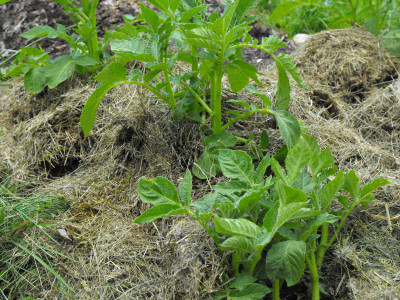
Mulching potatoes the Ruth Stout way
 Mom
picked up another half dozen bags of yard waste along her city curb
and brought it out to me last weekend. "It smells foul," she
warned me. "I think there might be dog poop in it, or something
awful."
Mom
picked up another half dozen bags of yard waste along her city curb
and brought it out to me last weekend. "It smells foul," she
warned me. "I think there might be dog poop in it, or something
awful."
She was right that the
grass clippings and autumn leaves stunk to high
heaven, but when I opened the bags and sent my gloved hands feeling
around, all I came across were some sodden bits. My best guess is
that a gardener bagged up his refuse last summer, then tossed the bags
into the garage and forgot about them. The moisture in the leaves
started some anaerobic decomposition and resulted in a stink, but no
real harm was done.
I'd been
meaning to hill my potatoes --- you're supposed to hill them
at four inches, and they somehow leapt from three inches to a foot this
week --- but decided to use Ruth Stout's method instead and just put my
spoiled grass clippings and leaves on top of the raised beds.
Technically, I'm not really following her lead since I planted the
potatoes in normal soil, but I've read that planting potatoes straight
into spoiled hay really only works when you've built up wonderful
garden soil, and I was planting in new beds. Take a look at the
embedded video to see a 90 year old Ruth Stout in her garden, or skip
ahead to 7 minutes into the video to see her planting potatoes.
In other potato news, I
should mention that the potato plants I covered
with
buckets during the last frost are three times bigger than
the ones I
let the frost nip. On the other hand, the beds that I let the
chickens work on for five days instead of three days have potato plants
twice as big as the
other beds, even though the fomer were uncovered during the
frost. I'm
guessing the boost of nitrogen let them grow large enough not to mind
the cold weather.
Thanks, Mom, for the
time-saving mulches!
Want more in-depth information? Browse through our books.
Or explore more posts by date or by subject.
About us: Anna Hess and Mark Hamilton spent over a decade living self-sufficiently in the mountains of Virginia before moving north to start over from scratch in the foothills of Ohio. They've experimented with permaculture, no-till gardening, trailersteading, home-based microbusinesses and much more, writing about their adventures in both blogs and books.
Want to be notified when new comments are posted on this page? Click on the RSS button after you add a comment to subscribe to the comment feed, or simply check the box beside "email replies to me" while writing your comment.
- Remove comment
- Remove comment
